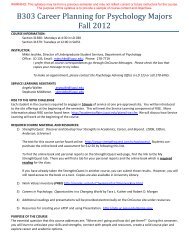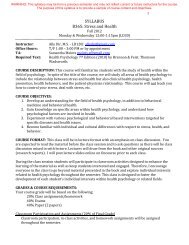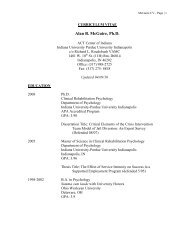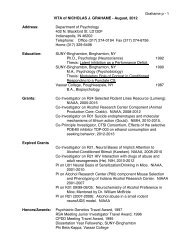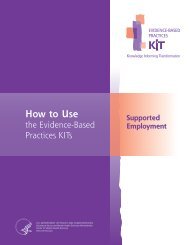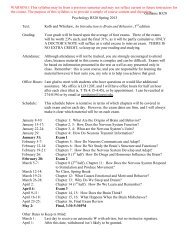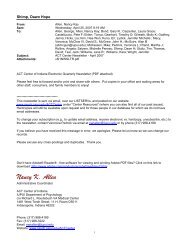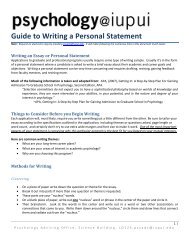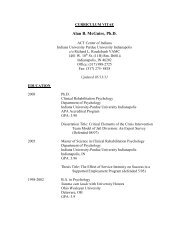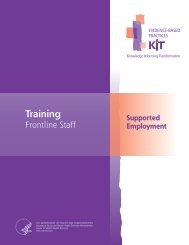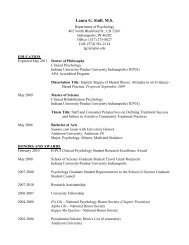B386 Course Syllabus, Fall 2012, Guare - Psychology @ IUPUI
B386 Course Syllabus, Fall 2012, Guare - Psychology @ IUPUI
B386 Course Syllabus, Fall 2012, Guare - Psychology @ IUPUI
You also want an ePaper? Increase the reach of your titles
YUMPU automatically turns print PDFs into web optimized ePapers that Google loves.
WARNING: This syllabus may be from a previous semester and may not reflect current or future instructors for the course.<br />
The purpose of this syllabus is to provide a sample of course content and objectives.<br />
<strong>B386</strong> Introduction to Counseling – <strong>Fall</strong> <strong>2012</strong><br />
Class Number 9577 John C. <strong>Guare</strong>, Ph.D., HSPP Teri Belkin, B.S.<br />
Thurs 9-11:45 am Office: LD126Q/274-6739 Office: 126V<br />
SL 109 E-mail: jguare@iupui.edu E-mail: tbelkin@iupui.edu<br />
This is not an easy course. There are four exams, multiple homework assignments, and an audiotape<br />
assignment. Moreover, it is an upper level course that builds upon required successful completion of<br />
previous psychology coursework. To take this course, it is absolutely necessary that you have successfully<br />
completed B104 and B380. If you have not done so, you must withdraw.<br />
<strong>Course</strong> Description<br />
The course is designed to help you learn and practice basic counseling skills. A specific “helper” model<br />
espoused by Gerald Egan will be emphasized. The course will consist of lectures, group discussion<br />
concerning a conceptual framework for helping others, and experiential learning by having you practice<br />
skills in class, role playing, etc. It is a combination of traditional book learning and practicing basic skills<br />
known to promote effective counseling.<br />
Required texts<br />
Egan, G. (I’ve seen it with 2009 or 2010). The skilled helper: A problem-management and opportunitydevelopment<br />
approach to helping (9th edition). Brooks/Cole Cengage Learning. ISBN is<br />
9780495601890.<br />
You DO NOT need the workbook entitled “Exercises in helping skills: A manual to accompany The<br />
Skilled Helper.” You also do not need the little booklet entitled “Skilled Helping Around the World.”<br />
You only need the textbook, and you need the 9 th edition.<br />
Principles of Undergraduate Learning<br />
The Principles of Undergraduate Learning (PULs) are the essential ingredients of the undergraduate<br />
educational experience at Indiana University Purdue University Indianapolis. Below are key aspects of<br />
the PULs and how we will address them in this course:<br />
1. Core Communication and Quantitative Skills. These skills will be addressed via periodic small group work in<br />
class and larger class discussion, communicating effectively in triads, and comprehending/interpreting “clients” as<br />
you practice core counseling skills.<br />
2. Critical Thinking. Key components of this PUL are “applying, analyzing, evaluating and creating” in relation<br />
to course content and assignments. You will practice/develop these skills throughout the course as we critically<br />
evaluate factors such as what keep people from changing, how to develop and evaluate the goal setting process and<br />
outcomes, etc.<br />
1
WARNING: This syllabus may be from a previous semester and may not reflect current or future instructors for the course.<br />
The purpose of this syllabus is to provide a sample of course content and objectives.<br />
3. Integration and Application of Knowledge. This will be inherently addressed due to the nature of our<br />
Counseling psychology course, applied homework assignments, and especially the application of skills in triads. In<br />
addition, the Audiotape assignment is specifically designed to help you demonstrate professional standards and<br />
competencies in core counseling skill areas.<br />
4. Intellectual Breadth, Depth and Adaptiveness. Students will develop their ability to examine and organize ways<br />
of thinking about human behavior, and to apply this knowledge in class triads, class discussion, the Audiotape<br />
assignment, and clinical vignette questions on exams.<br />
5. Understanding Society and Culture. Students will learn to recognize their own cultural traditions and to<br />
understand and appreciate the diversity of the human experience. Understanding the impact of societal and cultural<br />
life experiences on human behavior is essential for counseling to be productive.<br />
6. Values and Ethics. We will discuss the APA Code of Ethics and how to make sound clinical decisions with<br />
respect to individual conduct, citizenship and proper ethics. There will be an applied APA ethics component to<br />
our last exam. We will also address the need to develop cultural competency when dealing with individuals from<br />
different value systems, cultures, etc. Homework assignments will help clarify your values and whether or not you<br />
are living in line with such values.<br />
Your responsibilities<br />
Attendance is required. We will take attendance for both the 1 st half and 2 nd half of each class. Be in<br />
class on time. Tardiness is rude and disrespectful. Participation in class discussions and exercises is<br />
required. You need to show up and participate in order (1) for the course to be useful to you, and (2) to be<br />
able to earn a good grade. For many classes you will need to read about 2 chapters and do a homework<br />
assignment (which you will turn in on Oncourse). Given we only meet 15 times this semester, attending<br />
every class is critical. However, we will allow up to a maximum of 2.5 missed classes without penalty in<br />
consideration of any and all life events, etc. (e.g., illness, death in the family, severe weather, emergencies,<br />
car trouble, personal issues, family issues, alien abduction, doctor’s appointments, and everything else). If<br />
you miss three full classes, the score on your next exam will be reduced by 10%. If you miss five full<br />
classes, your next exam score will be reduced by 20%. If you miss seven full classes, your next exam<br />
score will be reduced by 30%. If you miss eight or more full classes (more than 50% of the course), you<br />
will be asked to leave the course. Missing both halves of a class counts as 1 missed class. Missing either<br />
the first or second half of a given class counts as half of a class missed. Students who attend consistently<br />
do better on exams, homework, the audiotape assignment, and get more out of the course.<br />
Think of this course like a client who agrees to attend counseling once/week for 15 weeks – by enrolling in<br />
this course you are agreeing to attend class once/week for 15 weeks. This should be your mindset. What<br />
the client gets out of the agreed-upon 15 sessions depends significantly on whether s/he consistently shows<br />
up, does her in-between session homework, and is truly invested in the process. The same is true for you.<br />
2
WARNING: This syllabus may be from a previous semester and may not reflect current or future instructors for the course.<br />
The purpose of this syllabus is to provide a sample of course content and objectives.<br />
Homework. Homework assignments are a very important aspect of the course. Homework assignments<br />
can take a substantial amount of time – plan for it. All homework assignments are posted on Oncourse<br />
under “Assignments.” This is described more fully on p. 6-7 of the syllabus.<br />
Class format<br />
Class meetings are primarily lecture-based but with substantial interaction from students. Some classes<br />
involve both a lecture and skills practice component. I will post chapter Power Point lectures on Oncourse<br />
under the “syllabus” tab. Skills practice will take place in small group format (triads).<br />
Triads. Triads consist of three people. One person will be the helper (counselor), one will be the helpee<br />
(client), and one will be the observer. After the helper has had a “counseling interaction” with the “client,”<br />
feedback is provided from each person in the triad. The helper starts first, stating how s/he thought it went,<br />
what s/he did well, not so well, etc. The client then gives his/her comments, followed by those of the<br />
observer. The goal is to use this feedback as a developmental growing process, helping the counselor<br />
know what s/he did well, and to identify what skills need further development. Following this process<br />
(both the counseling interaction and feedback), each member in the triad takes a different role, and a new<br />
counseling interaction begins that is followed by the same feedback format. This process occurs a 3 rd time,<br />
so that each person has adopted each of the three roles. I (and possibly Teri our TA) will quietly circulate<br />
and “sit in” on triads. We are there to help. You are not graded on this.<br />
When we practice skills using triads, you are to interact with different people each time you form a triad,<br />
that is, people who have not yet been in your triad groups. This is important for several reasons, e.g., it is<br />
better to practice across a variety of people, you won’t hear the same stuff and run out of things to say, etc.<br />
It is important to talk about concerns that are real to you. Do not make up things to talk about. On the<br />
other hand, do not “dump” incredibly major concerns on a fellow student and overwhelm him/her.<br />
Act in a professional manner when in triads. This is not the same as having a conversation with a friend.<br />
When in triads, the helper should view the client as a client and not a classmate. The interaction<br />
should mimic the professional nature of a counseling session. This means speaking quietly (we have a lot<br />
of people in this room), acting maturely, and not using laughter as a coping mechanism for nervousness.<br />
Important: Just as what is discussed in real therapy is confidential, the same holds true for what is<br />
discussed in triads. Confidentiality is very important. Start now. When personal issues are discussed in<br />
the classroom, they stay in the classroom. From an ethical perspective, your job is to protect the client.<br />
Keep in mind that virtually no one is at ease while doing triads. This uncomfortableness is normal, and<br />
will ease up as the semester advances. At times you will likely fumble and not know what to say. That is<br />
okay. You are not expected to do everything perfectly.<br />
Do not attempt to fix people, and do not give advice. You are not expected to “fix” people in your triads,<br />
nor on your audiotape assignment. We want you to learn and practice basic counseling skills (e.g., active<br />
listening, asking open-ended questions, showing empathy, understanding what is being said, listening to<br />
the message below the message, paraphrasing, challenging when appropriate, being “with” the client, etc).<br />
Do not give advice. The main applied goal in this course is to help people tell their story and for<br />
you to demonstrate empathy and other basic counseling skills.<br />
3
WARNING: This syllabus may be from a previous semester and may not reflect current or future instructors for the course.<br />
The purpose of this syllabus is to provide a sample of course content and objectives.<br />
Grades<br />
Your final course grade will come from a combination of sources:<br />
1. Exam 1 – 15% of course grade. This covers chapters 1-3.<br />
2. Exam 2 – 15% of course grade. This covers chapters 4-6.<br />
3. Exam 3 – 15% of course grade. This covers chapters 7-9 and any additional readings.<br />
4. Exam 4 – 15% of course grade. This covers chapters 10-12 and any additional readings.<br />
5. An audiotape demonstrating counseling skills – 20% of course grade.<br />
6. Homework assignments – a total of 20% of course grade. Each assignment is worth between 2 – 4<br />
points. They all add up (whether you do or do not complete them) and make a big difference in your<br />
course grade.<br />
Grade information on all aspects of the course will be posted on Oncourse. You can check it when you<br />
want to see where you stand. You must have an <strong>IUPUI</strong> username and e-mail account for you to be listed on<br />
the Oncourse roster and for you to use Oncourse.<br />
Attendance information will also be posted on Oncourse. For each class you will see either a 2 (attended<br />
both halves), 1 (attended one half), or a 0. These are not points that get added in to your overall course<br />
points…this is simply used as a marker for attendance.<br />
Final course grades (summing across all aspects) are stated below. Note: “rounding” is already included.<br />
This is it!<br />
A+ > 97.5% C+ 77.5 – 79.49%<br />
A 91.5 – 97.49% C 71.5 – 77.49%<br />
A- 89.5 – 91.49% C- 69.5 – 71.49%<br />
B+ 87.5 – 89.49% D+ 67.5 – 69.49%<br />
B 81.5 – 87.49% D 61.5 – 67.49%<br />
B- 79.5 – 81.49% D- 59.5 – 61.49%<br />
F < 59.49%<br />
Exams<br />
For the exams, you need to know the material in the text, that is, learn it and memorize it. Exams may also<br />
contain questions relevant to any handouts, videos, and lecture material not in the text. The “applied”<br />
aspects of the text material are assessed via the audiotape assignment and homework assignments, although<br />
exams will typically contain some applied items as well. We will NOT discuss chapter 13 (last chapter in<br />
the text) in the course, nor will you be responsible for chapter 13 material on any exam.<br />
There is no cumulative final exam. Exams will be given during the first part of the identified class.<br />
Exams are typically a combination of T/F, multiple choice (mostly multiple choice), and a few open-ended<br />
questions. You will have approximately one hour for each exam. Do not assume that because the class<br />
atmosphere tends to be relaxed, that the assessment phase (exams) is also relaxed.<br />
We will put a brief “practice test” for exam 1 on Oncourse no later than 9/7/12 so you can get an idea of<br />
what the exams will be like. This will be the only practice test we post.<br />
4
WARNING: This syllabus may be from a previous semester and may not reflect current or future instructors for the course.<br />
The purpose of this syllabus is to provide a sample of course content and objectives.<br />
Classroom behavior<br />
Act like a professional. Be on time to class. Laptops are permitted as long as they are ONLY used for our<br />
class, such as pulling up our power point slides. It is not acceptable to use your laptops or other web<br />
devices during class for anything other than class purposes, as such non-class behavior is rude, annoying to<br />
others, and very unprofessional. Cell phones must be on silent mode during class. Texting is not allowed<br />
– either reading or sending texts.<br />
Helpful exam hints<br />
In previous semesters, students who did well on the exams outlined each chapter by taking key notes, then<br />
studied their notes. By outlining the chapter material, you learn it better (you are being active with the<br />
material). Reviewing your notes further helps consolidate the material in your memory. Study with a<br />
friend by asking each other questions -- be active!<br />
Oncourse<br />
We will use Oncourse for a variety of purposes. As mentioned, you can check your grade and attendance<br />
status by using Oncourse. We will also post homework assignments on Oncourse. If we think it is<br />
appropriate, we will post exam hints by the Thursday before the exam, so make sure you check Oncourse.<br />
You can also e-mail Teri or me if you have any questions, e-mail classmates to share class notes, plan a<br />
study group, etc.<br />
Audiotape assignment<br />
The purpose of this assignment is for you to demonstrate some of the applied basic skills we will discuss in<br />
class and that you will practice in triads. The audiotape will be 10 minutes in length and is due on 11/8/12<br />
in class. We will provide you with much more detailed information later in the course (e.g., exactly what<br />
to do, your responsibilities, how the grading will be done). Students state they learn a lot from this<br />
assignment. It is worth 20% of your course grade. It will be handed back the last day of class (it takes a<br />
lot of time to grade).<br />
Keep in mind<br />
Every semester there are several students who miss the “next grade up” by 1 percentage point or less. This<br />
is obviously frustrating and disheartening. What is the best way to avoid this situation? Do ALL your<br />
work to the best of your ability. Hand in all your homework assignments, and put effort into each one.<br />
Every point matters, and they all add up.<br />
5
WARNING: This syllabus may be from a previous semester and may not reflect current or future instructors for the course.<br />
The purpose of this syllabus is to provide a sample of course content and objectives.<br />
Homework assignments<br />
There will be 7 homework assignments (not counting the audiotape assignment). This yields a total of 20<br />
possible points that contributes to your overall 100 course points. Some assignments are designed to<br />
promote self-reflection and self-examination. This is because we are asking clients to do the same in the<br />
counseling process, so you need to get comfortable with this process as well.<br />
Homework will be graded and your score will be posted on Oncourse.<br />
You must turn in your homework assignments on time. Late homework assignments will not be<br />
accepted. The absolute latest an assignment will be accepted is by 11:55pm on the assigned Wednesday<br />
due date. These assignments must be emailed to “Instructor” via Oncourse by the specified dates and time<br />
on the syllabus below. “Instructor” means both Teri (our TA) and I will receive them. Teri will grade<br />
them. You can complete the assignments earlier than the due date if you like.<br />
You must post your assignments on Oncourse. This is how you do it:<br />
1. Go to Oncourse and click on <strong>B386</strong>.<br />
2. Look at the column on the left side and click on “Assignments 2.”<br />
3. Choose the assignment you want and click on “View details.” This will pull up the assignment.<br />
4. Under the “Supporting Materials” heading click on the Word document which is the homework<br />
assignment and open it. You are now typing in a Word document.<br />
5. Type in your answers to the homework questions.<br />
6. Save the completed homework in a Word document.<br />
7. Under the “Attachments” heading, click on “Add Attachment” and attach your completed<br />
homework assignment. It will then show your homework has been attached.<br />
8. Click Honesty Pledge – meaning that you did your work by yourself.<br />
9. Click “Submit.”<br />
Oncourse will automatically close the assignment at 11:55pm on the specified due date. You will not be<br />
able to send your assignment after this time. Oncourse will notify us of your submission.<br />
The UITS Support Center services and hours in Indianapolis are:<br />
<br />
<br />
<br />
ITHelpLive (live chat with a consultant): Service available Monday-Friday 8am-9pm at:<br />
http://ithelplive.iu.edu/ You need to have a Windows computer, and you'll need to supply your IU<br />
Network ID username and passphrase to access ITHelpLive. For information about available<br />
services, please see the Knowledge Base document At IU, what is ITHelpLive?<br />
Phone support: 317-274-4357, 24 hours a day, 7 days a week. Email support:<br />
ithelp@iu.edu<br />
Walk-in support: The UITS Support Center in IT 129 is open Monday-Thursday 8am-9pm, Friday<br />
8am-5pm, Saturday 9am-3pm, and Sunday noon-4pm.<br />
6
WARNING: This syllabus may be from a previous semester and may not reflect current or future instructors for the course.<br />
The purpose of this syllabus is to provide a sample of course content and objectives.<br />
Remember – all assignments must be submitted before 11:55pm on the WENESDAY night as<br />
specified below.<br />
Wednesday Due Date Homework Assignment<br />
8/29/12 HW #1 [2 points]<br />
9/5/12 HW #2 -- Observation assignment: this is for you to observe people in public and<br />
describe their interactions. The handout tells you what to look for and how to<br />
write it up. [3 points]<br />
9/19/12 HW #3 [3 points]<br />
9/26/12 HW #4 [3 points]<br />
10/17/12 HW #5 -- Helper/Client Assignment [4 points]<br />
10/31/12 HW #6 [2 points]<br />
Reminder: Audiotape assignment is due 11/8/12 in class.<br />
(This is not one of the 7 homework assignments)<br />
12/5/12 HW #7 – Thought Record. This cognitive therapy assignment asks you to identify<br />
your own automatic thoughts/cognitive distortions and to complete all 5 columns<br />
in the Thought Record for three different situations using the Thought Record.<br />
[3 points]<br />
7
WARNING: This syllabus may be from a previous semester and may not reflect current or future instructors for the course.<br />
The purpose of this syllabus is to provide a sample of course content and objectives.<br />
Class Date Topic/book chapters<br />
CLASS SCHEDULE – SOME CHANGES MAY OCCUR<br />
1 8/23/12 Introduction/Overview; Triads ice breaker<br />
2 8/30/12 Egan ch. 1 & 2 (Have read ch. 1 & 2 for today)<br />
2 nd half – triads (time permitting)<br />
3 9/6//12 Egan ch. 3 (Have read ch. for today)<br />
2 nd half – triads<br />
(Brief practice test available on Oncourse by 9/7//12)<br />
4 9/13/12 Exam 1 – covers chapters 1-3<br />
2 nd half – Show videoclips and discuss (from “Basic Counseling Responses”)<br />
5 9/20/12 Egan ch. 4 & 5 (Have read ch. 4 & 5 for today)<br />
2 nd half – triads (time permitting)<br />
6 9/27/12 Egan ch. 6 (Have read ch. 6 for today)<br />
2 nd half – triads (time permitting)<br />
7 10/4/12 Exam 2 – covers chapters 4-6<br />
2 nd half – discuss audiotape, show scoring guidelines, what to do/not do, etc.<br />
Discuss HW assignment #5 due in 2 weeks<br />
8 10/11/12 Egan ch. 7 & 8 (Have read ch. 7 & 8 for today);<br />
2 nd half – Show clinical videoclip and discuss<br />
9 10/18/12 Egan ch. 9 (Have read ch. 9 for today);<br />
10 10/25/12 Exam 3 – covers chapters 7-9<br />
2 nd half – Guest Speaker -- Donna Pollard, LMHC<br />
11 11/1/12 Intake assessment (not Egan); 2 nd half – Egan ch. 10<br />
12 11/8/12 Note: Audiotape assignment is due today in class!<br />
Egan ch. 11-12; 2 nd half – Discuss APA Ethics<br />
13 11/15/12 Guest speakers from IN Professional Licensing Agency;<br />
Handout cognitive-behavioral therapy reading<br />
11/22/12 No class – Thanksgiving Break<br />
14 11/2912 Overview of Cognitive-Behavior Therapy (CBT)<br />
15 12/6/12 Exam 4 – covers chapters 10-12 and any lecture material/handouts<br />
for Ethics and CBT. This is it, no cumulative final<br />
8



